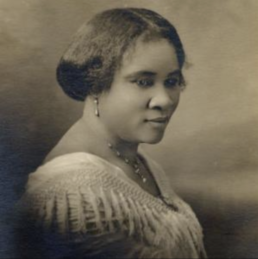These life stories may contain descriptions of childhood trauma and abuse, as well as images, voices and names of people now deceased. If you need help, you can find contact details for some relevant support services on our support page.
African American activist and entrepreneur, Madam C.J. Walker (1867-1919), was in kinship care as a child.
Madam C.J. Walker was born Sarah Breedlove in Louisiana to Minerva Anderson and Owen Breedlove, former slaves who had taken up sharecropping to support themselves after the civil war.
Both of Sarah’s parents were dead by the time she was seven. The child went to live with her older sister, Louvenia, and they worked together picking cotton. At age fourteen Sarah married Moses McWilliams, in part because she needed to escape the abusive attentions of her brother-in-law.
In 1889, with a four-year-old daughter in tow, Sarah made her way to St. Louis, Missouri. There she had three brothers who worked as barbers and she took up laundry and cooking work. She also joined the African Methodist Episcopal Church and was inspired and mentored by many in the community.
In 1904, when she was thirty-seven and concerned about hair loss, Sarah, began using a hair product created by African American businesswoman, Annie Turbo Malone. She subsequently became one of the Black women who worked as sales agents for Malone.
A year later, Walker moved to Denver, Colorado, where she married ad-man Charles Joseph Walker, renamed herself “Madam C.J. Walker,” and with $1.25, launched her own line of hair products and straighteners for African American women, “Madam Walker’s Wonderful Hair Grower” (Michals).
After she divorced her husband, in 1910 Walker moved to Indianapolis and set up a factory.
An advocate of black women’s economic independence, she opened training programs in the “Walker System” for her national network of licensed sales agents who earned healthy commissions. Ultimately, Walker employed 40,000 African American women and men in the US, Central America, and the Caribbean. She also founded the National Negro Cosmetics Manufacturers Association in 1917 (Michals).
As her business expanded so her wealth increased, and her contributions. She provided scholarships for African American students at the Tuskegee Institute and other black colleges, donated to the YMCA, to the anti-lynching campaign being run by the NAACP, and to a fund for the preservation of Frederick Douglass’ home in Washington, DC.
Before she died, Walker bought a property that in 1927 became the Madame Walker Theatre Centre.
Writes Tyrone McKinley Freeman:
…Walker didn’t just live a life of hard-won opulence. She exemplified black women’s generosity. Her philanthropy and activism imbued every aspect of her daily life. “I am not and never have been ‘close-fisted,’ for all who know me will tell you that I am a liberal hearted woman,” Walker told the audience of the 1913 National Negro League Business meeting sponsored by prominent black leader Booker T. Washington.
In July 2018, Netflix announced a new drama series, Self Made: Inspired by the Life of Madam C.J. Walker, with Octavia Spencer playing Walker. The program became available in 2020.
References:
Bundles, A’Lelia. “Madam C.J. Walker American Businesswoman and Philanthropist.” Britannica, 2017. https://www.britannica.com/biography/Madam-C-J-Walker
Freeman, Tyrone McKinley. “Netflix’s ‘Self-Made’ miniseries about Madam C.J. Walker leaves out the mark she made through generosity. The Conversation, 17 March 2020. https://theconversation.com/netflixs-self-made-miniseries-about-madam-c-j-walker-leaves-out-the-mark-she-made-through-generosity-132848
Michals, Debra. “Madam C.J. Walker.” National Women’s History Museum, 2015. https://www.womenshistory.org/education-resources/biographies/madam-cj-walker
Image available here.
